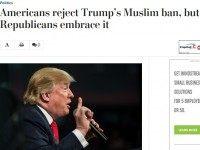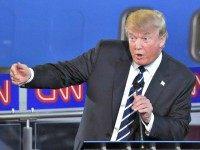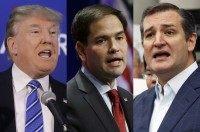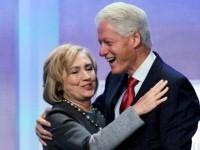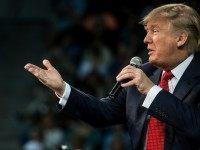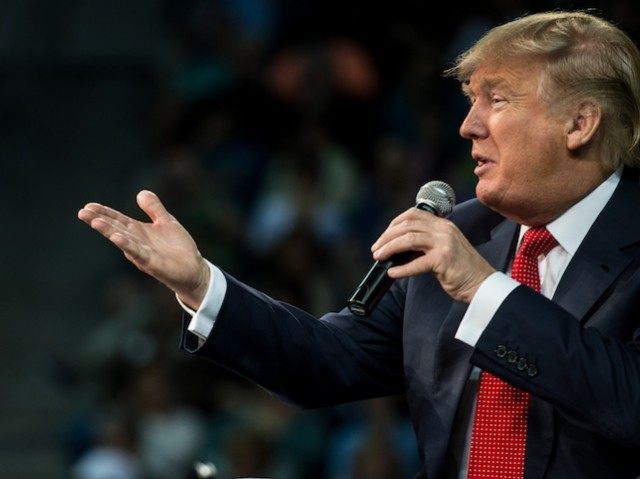But Rubio is behind both of his top-tier rivals in national polling averages and is even further back in Iowa, home to the first-in-the-nation caucuses, where he holds fourth place, albeit behind the fast-fading Ben Carson.An even deeper problem for the Florida senator is that other candidates who are competing for the same voters are unlikely to drop out before the New Hampshire primary. That means votes that might otherwise go to Rubio could instead be won by contenders such as former Florida Gov. Jeb Bush, New Jersey Gov. Chris Christie and Ohio Gov. John Kasich.
Add all these factors together and it becomes clear why establishment Republicans are so concerned, especially in the wake of Trump’s inflammatory call to ban Muslims from entering the United States. Cruz, meanwhile, has been enjoying a rapid rise in the polls.
“Listen, I think both Cruz and Trump would have a similar impact on the party, neither of which would be very good. I am actually more concerned about Cruz than I am about Trump,” said GOP strategist John Feehery, a former senior leadership aide who is a columnist for The Hill.
Feehery added, “I think Cruz has made a reputation of relentless mendacity ... I think he’s a demagogue and I think he’ll destroy the party. I think Trump is much more of a blowhard. But there’s not really a dime’s worth of difference between Trump and Cruz.”
As of Wednesday afternoon, Trump sat atop the RealClearPolitics national polling average, with the backing of 29.3 percent of GOP voters, with Cruz in second, at 15.5 percent. Rubio was just behind, with 14.8 percent. In Iowa, where the first caucuses will be held on Feb. 1, Cruz runs much closer, with 22.3 percent average support to Trump’s 25.7 percent. Rubio is farther behind in the Hawkeye State than nationally, drawing 13.7 percent backing.
Trump’s comments calling for a “shutdown” of Muslims entering the U.S. have been condemned by many Republicans, as well as Democrats and unaligned observers. Included among his critics are Speaker Paul Ryan (R-Wis.) and Senate Majority Leader Mitch McConnell (R-Ky.), who both lambasted him on Tuesday. The condemnation of a party’s presidential front-runner by that same party’s most senior members of Congress is without precedent, at least in modern times.
The opprobrium from on high will not necessarily doom Trump. A Bloomberg Politics poll released Wednesday indicated that 64 percent of likely Republican primary voters supported the idea of temporarily banning Muslims from coming to America.
But Washington Republicans shake their heads at the damage they believe the real estate tycoon is inflicting on the party’s image. They are also enraged about his suggestion that he could mount a third-party run if he is not treated in a way that he deems fair during the GOP primary process.
“Donald Trump says he might make a third-party run if he is mistreated by the party, but Donald Trump has severely mistreated the Republican Party with his outlandish and over-the-top statements against Hispanics, women and now against religion in terms of Muslims,” said Ron Bonjean, a GOP consultant and former aide to House and Senate Republican leaders.
Bonjean expressed less outrage about Cruz personally, but just as much skepticism about his chances of prevailing in a general election.
Alluding to reports that Cruz and his advisers believe he can win the White House by boosting enthusiasm and turnout solely among the conservative base, Bonjean said, “If Cruz would follow through on his promise not to court the middle, we would lose the general election.”
The Cruz camp has also made the case it can win over “Reagan Democrats” in the general election, though some Republicans are skeptical.
All of the GOP establishment angst could be good news for Rubio. The fact that he has now achieved a degree of separation from other establishment-friendly choices such as Bush, Kasich and Christie could create a snowball effect where more voters are drawn to his banner.
Asked if the shift toward Rubio could pick up speed, South Carolina GOP strategist Dave Woodard said, “I think it could — and the reason is, he says all the right things.”
Woodard, who is also a professor of political science at Clemson University, outlined the traits that many people believe would make Rubio a strong candidate in a general election, including his youth, his oratorical ability and his heritage as the son of Cuban immigrants.
“People who are concerned about losing again — and that’s what it boils down to — might say, ‘I hadn’t really considered Rubio but he looks like the best establishment choice. I might go with him,’ ” Woodard said.
Others who favor establishment candidates caution that Rubio does not have that segment of the party anywhere close to locked down, however.
Feehery said he believes that Rubio is the candidate Democrats fear the most, but added that he isn’t sure the center-right vote would necessarily coalesce around him. He noted that Christie has been gaining ground in New Hampshire, and added, “I wouldn’t count Bush out.”
He noted that previous candidates who have appealed to the establishment wing in both major parties have come through dire straits to win the nomination in the end. He cited Sen. John McCain (R-Ariz.) in 2008 and then-Sen. John Kerry (D-Mass.) in 2004 as examples.
Centrist Republicans believe the party needs to act soon in order to defeat Trump and Cruz.
“There needs to be a consolidation of candidates that attract white-collar and establishment voters, and that will compete for the nomination,” said Bonjean. “At this point, you are seeing some movement in the establishment toward Rubio — a little bit. It feels like a plate-shifting is happening.”
